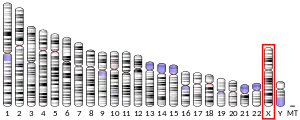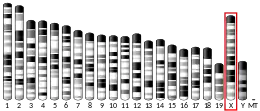| ApoO | |||||||||
|---|---|---|---|---|---|---|---|---|---|
| Identifiers | |||||||||
| Symbol | ApoO | ||||||||
| Pfam | PF09769 | ||||||||
| InterPro | IPR019166 | ||||||||
| |||||||||
Apolipoprotein O also known as protein FAM121B is a protein that in humans is encoded by the APOO gene. APOO is a member of the apolipoprotein family.[5]
The human, apolipoprotein O is a 198 amino acids protein that contains a 23 amino acids long signal peptide. The apoprotein is secreted by a microsomal triglyceride transfer protein (MTTP)-dependent mechanism, probably as a VLDL-associated protein that is subsequently transferred to HDL. Apolipoprotein O is the first chondroitine sulphate chain containing apolipoprotein.[5]
Apolipoproteins are proteins that binds to lipids. Members of this family promote cholesterol efflux from macrophage cells. They are present in various lipoprotein complexes, including HDL, LDL and VLDL.
References
- 1 2 3 GRCh38: Ensembl release 89: ENSG00000184831 - Ensembl, May 2017
- 1 2 3 GRCm38: Ensembl release 89: ENSMUSG00000079508 - Ensembl, May 2017
- ↑ "Human PubMed Reference:". National Center for Biotechnology Information, U.S. National Library of Medicine.
- ↑ "Mouse PubMed Reference:". National Center for Biotechnology Information, U.S. National Library of Medicine.
- 1 2 Lamant M, Smih F, Harmancey R, Philip-Couderc P, Pathak A, Roncalli J, Galinier M, Collet X, Massabuau P, Senard JM, Rouet P (November 2006). "ApoO, a novel apolipoprotein, is an original glycoprotein up-regulated by diabetes in human heart". J. Biol. Chem. 281 (47): 36289–302. doi:10.1074/jbc.M510861200. PMID 16956892.
External links
- Human APOO genome location and APOO gene details page in the UCSC Genome Browser.
Further reading
- Talmud PJ, Drenos F, Shah S, et al. (2009). "Gene-centric association signals for lipids and apolipoproteins identified via the HumanCVD BeadChip". Am. J. Hum. Genet. 85 (5): 628–42. doi:10.1016/j.ajhg.2009.10.014. PMC 2775832. PMID 19913121.
This article is issued from Wikipedia. The text is licensed under Creative Commons - Attribution - Sharealike. Additional terms may apply for the media files.



